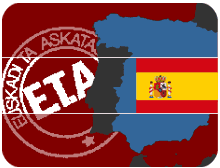ETA plants car bomb after separatists are barred from poll
 Madrid - Suspected members of the militant Basque separatist group ETA on Monday planted a car bomb in Madrid, causing material damage but no injuries, Spanish Interior Minister Alfredo Perez Rubalcaba confirmed.
Madrid - Suspected members of the militant Basque separatist group ETA on Monday planted a car bomb in Madrid, causing material damage but no injuries, Spanish Interior Minister Alfredo Perez Rubalcaba confirmed.
ETA was believed to be reacting to an overnight announcement by the Supreme Court that it was barring two radical separatist formations from contesting the Basque regional elections on March 1.
The bomb exploded in front of a construction company at the Campo de las Naciones fair ground.
An anonymous caller warned the Red Cross that the bomb was about to go off, speaking in the name of ETA.
The warning, which was given 1.5 hours earlier, left police time to evacuate buildings and to close access roads and the underground to the area, creating large traffic jams.
Only a part of the explosives inside the van detonated, according to police sources.
The blast nevertheless ripped a three-metre-wide hole in the ground, damaging facades and windows of buildings, dozens of parked cars and a traffic bridge.
The attack was ETA's first in Madrid since December 2006, when a car bomb killed two Ecuadorian immigrants at a Barajas airport underground parking lot.
That attack led to the collapse of a six-month attempt at peace talks between ETA and Prime Minister Jose Luis Rodriguez Zapatero's government.
The company which was targeted by Monday's bombing participated in the construction of a high-speed railway, which is due to link the Basque cities of Bilbao, San Sebastian and Vitoria with each other, Madrid and France by 2013, officials said.
ETA has previously attacked companies involved in the project, including the killing of entrepreneur Ignacio Uria in December.
ETA sees the railway as representing the interests of the Basque region's governing Basque Nationalist Party (PNV), which it regards as too moderate in promoting the Basque nationalist cause.
ETA had been expected to stage an attack to protest the exclusion of radical separatists from the Basque regional elections on March 1.
The Madrid bombing followed an overnight announcement by the Supreme Court that it had barred the political formations D3M and Askatasuna from the poll on grounds of links with ETA.
The two had representatives with connections to previously banned separatist parties, and similar goals, the court said.
ETA's political wing Batasuna, whose predecessor Euskal Herritarrok took 10 per cent of the Basque vote in 2001, was outlawed in 2003.
Its successor Communist Party of Basque Lands (PCTV-EHAK) had 9 legislators in the 75-member regional parliament, while Basque Nationalist Action (ANV) controlled dozens of localities at municipal level.
Both parties were made illegal in 2008.
The Spanish government and the public prosecutor's office had sought bans on Askatasuna and D3M in what was seen as a strategy to crack down on the entourage of ETA, in addition to the group itself.
If the Constitutional Court confirms the ban, radical Basque separatists will be left without representation in regional elections for the first time.
Basque regional Prime Minister Juan Jose Ibarretxe accused the Supreme Court of acting in the electoral interest of Zapatero's Socialists, who are hoping to oust the PNV from the Basque regional government for the first time in two decades.
ETA is blamed for more than 800 deaths since 1968 in its campaign for a sovereign Basque state. Four of the victims were killed in 2008.
ETA is listed as a terrorist organization by the European Union and the United States. (dpa)